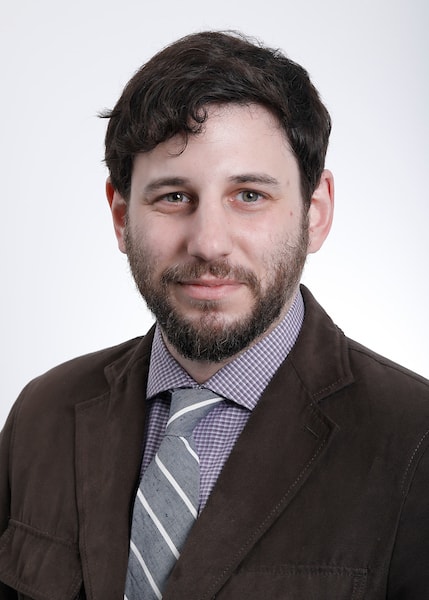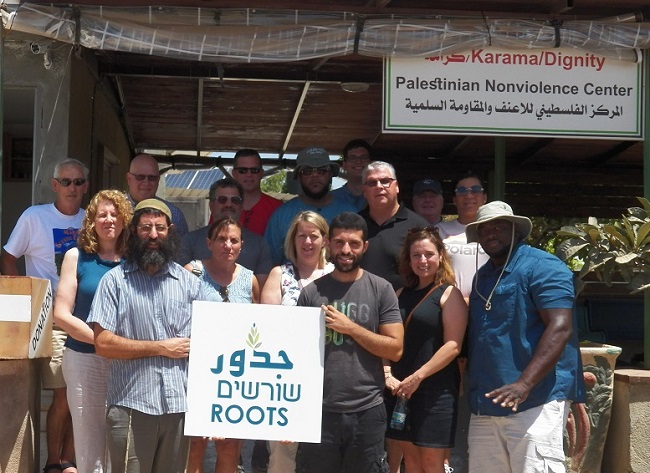JCRC Study Tour for Labor Leaders with Roots/Shorashim/Judur

This week’s message is from Director of Israel Engagement Eli Cohn-Postell.
Last Friday, I watched in admiration as Shaul Judelman and Noor Awad unwrapped a new sign as though it were a birthday present. The sign was for Roots/Shorashim/Judur, the grassroots group of Israelis and Palestinians living in the West Bank who come together to foster understanding, nonviolence, and transformation among their societies. Shaul and Noor looked like they could have been two kids in a candy store, and the scene was only strange because these two were never supposed to meet in the first place. Both live in the West Bank. Shaul is an American-Israeli living in Tekoa and Noor is a third-generation Palestinian refugee living in nearby Bethlehem.
We get to see friendships like Noor and Shaul’s develop because we visit with them consistently on our JCRC Study Tours. During this week’s Study Tour to Israel for Labor leaders, we got an up-close look at some of the changes taking place in Israel. I heard many times this week that Israel is experiencing a transition moment, and this week we met speakers who shared their perspectives on the current trends shaping Israeli society and its future. As with any country, Israel is too complex and multi-faceted to know exactly in what direction the country is headed. Nonetheless, I was encouraged this week by the example set by Shaul, Noor, and others, which make me believe that some things are changing for the better.
In many ways, Israel is at a crossroads. Most obviously, Israel is in the middle of its second election campaign this year, which no one expected. This raises the obvious question of who Israelis will choose to lead them, with potential implications for the religious status quo, the Israel-Diaspora relationship, and many other issues.
Israel’s Labor movement is also in a transition moment. As in many places around the world, union membership dropped significantly in Israel beginning in the 1980s. However, Israel has seen that number rebound slightly in recent years, and many of the people we spoke with expressed guarded optimism about the future of Labor in Israel.
On a sadder note, many people feel that they are in a quiet moment in between wars. We visited Rambam hospital in Haifa, where we toured an underground parking lot that can be turned into a functioning, bomb-proof hospital in 72 hours. Over and over, the nurse who led our tour told us how the underground hospital would be used when, not if, the next war came. We heard similar language in the south near the Gaza Strip, where people talked about preparing for the next, seemingly inevitable round of violence back and forth between Israel and Hamas.
Finally, Israeli and Palestinians speakers told us about the generational shift that their societies are undergoing. Many speakers referenced the iconic image of Bill Clinton looking on as Yitzhak Rabin and Yasser Arafat shook hands on the White House Lawn in 1993. The number of people who do not remember that moment is growing, they are reaching adulthood, and their entire attitude toward peacebuilding and the “other” is different from previous generations. We do not know exactly how this new attitude will crystalize, but we should be hopeful about the rise of a generation that can re-imagine the possibilities of peace and human-to-human connection.
I was encouraged that so many of our speakers were working to make sure that this moment of transition is being leveraged to create positive change for Israelis and Palestinians. For example, many people are working to improve the conditions of the Labor force in Israel. This includes growing unions and a rejuvenated Histadrut (Israeli Labor federation). We learned about governmental programs and NGOs providing services and protections for all of Israel’s workers, including non-Israeli citizens.
We met with Hamutal Gouri, who is working to close the opportunity and pay gaps between men and women in Israel, and to advance the role of women in peacemaking. Hamutal is one of the founders of Women Wage Peace, a remarkable successful social movement that has grown to over 40,000 members in a few short years.
And, of course, we spent time with Noor and Shaul at Roots. I have met with activists at Roots many times now, and you can see how the trust and friendship between the participants has grown over time. This is enabling others in their communities to get involved, and to share in the belief that developing relationships with each other will create a better experience for everyone.
On these trips, we hear from people all over the political and ideological spectrum. I assure you that not everything in Israel is rosy. But this week, the message we heard with the most clarity was this one: there is hope to be found in the voices and experiences of those seeking justice and a better future for Israel and Palestinians. I am optimistic.
Shabbat Shalom,
Eli


